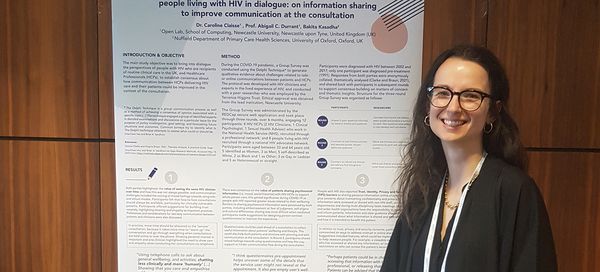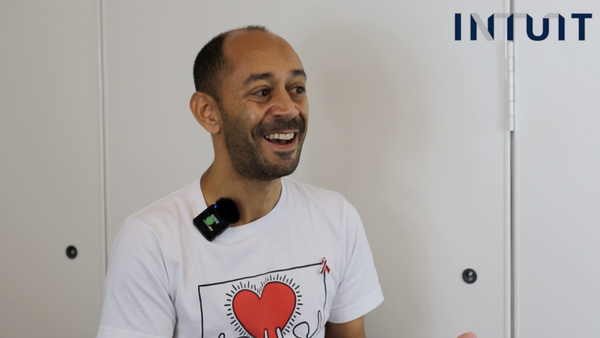News
Celebrating World AIDS Day: Global solidarity, shared responsibility in HIV research
World AIDS Day takes place on 1st December each year. It is an opportunity to remember the people who have died of AIDS-related illnesses, and to celebrate the progress made with treating HIV, and show support for people living with HIV.
The 2020 Worlds AIDS Day theme is ‘global solidarity, shared responsibility’.
As an interdisciplinary team, we recognise the collective responsibility we have pursuing the INTUIT programme of research; and we understand the importance of collaboration, co-production and of centring designs that work for the end user. Almost all the participants involved in INTUIT studies are people living with HIV. People living with HIV also sit on our Strategic Advisory Board and conduct studies with our project team.
This year, existing health inequalities have been illuminated due to the COVID-19 pandemic. These are health inequalities that have been long recognised within the global HIV response. People living with HIV are disproportionately more likely to come from marginalised and minoritised communities. Many parallels have drawn between the early response to the COVID-19 pandemic and the HIV epidemic. Both viruses were initially met with fear and have impacted the most marginalised communities.
Across the world, the pandemic has impacted people with HIV in a range of ways, which have been determined by pre-existing infrastructures (or lack of). Although people with HIV in the UK have continued to have access to medication, the nature of the support and care provision (e.g. clinical appointments) has changed significantly.
Peer support and mentoring is a bedrock of HIV care and support. At the beginning of the pandemic, many questions were raised about how this service could – and would – continue. INTUIT board member, Jane Shepherd, reflected on how the pandemic has impacted her ability to support other women living with HIV.
Our physical contact with each other has been restricted considerably. This has shone a light on the potential of digital and online tools for keeping us connected. But it is crucial that these tools are not only available for the already privileged few. The barriers to having access to smartphones and computers, and to getting online, can be non-trivial and needs to be understood and addressed so that a ‘digital divide’ isn’t widened in our responses to COVID-19 measures.
The pandemic has emphasised the need to look beyond HIV clinical outcomes and overall Quality of Life (known as the ‘Fourth 90’) – especially in term of mental health and emotional wellbeing. People living with HIV are more likely to experience poorer mental health.
In its response to the APPG Inquiry into HIV and COVID-19, Sophia Forum noted the specific impact on women with HIV and found racial disparities in ‘noticeable difference in several areas.’ This included severity of mental health concerns, caring responsibilities, access to HIV care and employment concerns.
Many of the reflections and insights captured by Jane Shepherd and Sophia Forum have also been reflected in our studies. As was the case for many researchers, the pandemic demanded that we adapt our approach, both in terms of our methods and the research questions. We moved data collection online and included questions about the impact of this unprecedented time. We will share key insights early next year, but overall:
- In our studies with people with HIV, the participants reported feeling lonelier and finding it harder to manage their mental health with less access to peer support;
- In our studies with healthcare professionals, the participants reported having to change their service delivery significantly, and they discussed the impact of remote communication on conversations and on patients’ mental health.
The research we do with people living with HIV must acknowledge this landscape and adjust accordingly. As a team, we refer to this as a practice of ‘ethical responsiveness’. As researchers working within this space, we must ensure that we do not inadvertently recreate institutional barriers that have led to certain communities being more impacted by HIV and left behind in research. This includes designing accessible research and ensuring that everyone involved is counted. Michelle Ross (Founder and Director at CliniQ) writes about the way that binary data collection results in ‘missing data’ by erasing trans and non-binary people in research. We must not assume who does or doesn’t want to be involved in our research nor should we restrict how our participants are able to self-determine.
We can do this by:
- centring the needs of those we intend to benefit from our work and focusing on maximising impact based on priorities that they identify;
- recognising our perspectives, opinions and assumptions and how these impact our research design;
- providing disaggregated data and highlighting disparities in findings, and in turn addressing the gaps in knowledge between key groups living with HIV;
- involving people with HIV beyond research participants and in the design and shaping of our work;
- creating a space for feedback and reflection and in turn evolving and adapting to that feedback.

INTUIT peer researcher, Bakita Kasadha, recently spoke at the Critical Perspectives on AI conference run by University of Edinburgh. Artificial Intelligence (AI) is intelligence demonstrated by machines. It is often used to describe how machines or computers that mimic how the human mind works, like learning and problem solving. It has the potential to add tremendous economic and social value. However, AI is often informed by algorithms that use pre-existing data. Where data and findings are not representative or informed by bias, it can have grave consequences for communities who are already underserved. Bakita highlighted the need for social responsibility in the research and design of emerging ‘smart’ technologies that can use computer programmes (called algorithms) to ‘read’ how people are using their computers and smart phones, (e.g. what information they are seeking, entertainment they are consuming, who they are connecting with), to make judgments about their interests and possibly their behaviour – basically profiling them. Designers of such ‘smart’ technology applications need to carefully consider how social inequalities, prejudices and assumptions may be deepened through poor design. As an interdisciplinary team of design researchers, it is our shared responsibility to unpack and chip away at the barriers and assumptions that shape interactive technology applications and that can leave behind the most in need.


